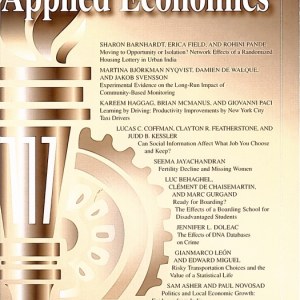
Bolhaar, J., Ketel, N. and \van Der Klaauw\, B. (2019). Job search periods for welfare applicants: Evidence from a randomized experiment American Economic Journal: Applied Economics, 11(1):92--125.
-
Affiliated authors
-
Publication year2019
-
JournalAmerican Economic Journal: Applied Economics
We combine a randomized experiment with administrative data to study the effects of mandatory job search periods in the Dutch welfare system. Job search periods postpone the first welfare benefits payment and encourage applicants to start searching for jobs actively. Job search periods substantially reduce benefits take up. The decline in benefits receipt is permanent, but fully compensated by increased earnings because of higher reemployment rates. We do not find detectable effects on health and crime outcomes, nor do we observe income declines for more vulnerable applicants. Our results suggest that job search periods are an effective instrument for targeting benefits to welfare applicants.